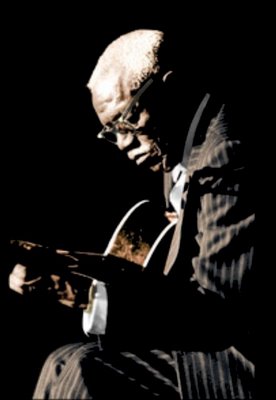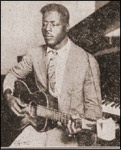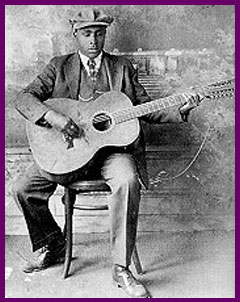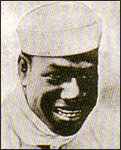FURRY LEWIS / “When My Baby Left Me”
Thanks in part to a sale on boxed sets at Borders I’ve been listening to a lot of blues lately. I have to say, I’m getting quite the education. I’m finally hearing many songs that I’ve only known as inspiration for other songs and even better than that I’m discovering entire sub-genres that I hadn’t previously known even existed.

I’m not sure what to call the sub-genre that includes songs like Furry Lewis’ “When My Baby Left Me.” Haunted country blues? Ghost acoustic folk? The overall tone is dark and cold, but Lewis’ acoustic guitar shimmers like broken glass caught in a sudden streak of light. And the lyrics are every bit as fascinating as the guitar playing. Lewis sings things like, “She caught the rumbling and I caught the falling down.” Grammatically and logically the line makes no sense but that doesn’t stop you from knowing exactly what he means. I’d be less intrigued by a song like this if it were some sort of lone accident. But apparently there’s a whole slew of tunes like “When My Baby Left Me.” In fact, Lewis’ entry into the blues’ ephemeral side came quite late. Lewis cut “When My Baby Left Me” in 1961 after a nearly thirty-year absence from recording during which time he is said to have made a living as a Memphis street sweeper.
If blues compilations didn’t have liner notes, I’d never have known Lewis’ recording was done in the 60s because “When My Baby Left Me” sounds an awful lot like records such as Blind Willie McTell’s “Statesboro Blues” and Robert ‘Barbecue Bob’ Hicks’ “Motherless Chile Blues,” both of which date back to pre-Depression times.
I like both McTell’s and Hicks’ records for the way they mix bravado with vulnerability, not just lyrically but also in the way the two bluesmen perform their vocals. Both Hicks and McTell have big, commanding voices and charisma to spare. But they also both have a keening, shrill way of ending their notes that makes them sound sad and lonely as opposed to just pissed off. At times, their way of singing sounds like the 1920s equivalent of the male falsetto from soul ballads of the 60s and 70s.

Perhaps the ultimate example of this slow and spooky type of blues tune is Blind Willie Johnson’s “Dark Was The Night, Cold Was The Ground.” According to the liner notes of The Blues: A Musical Journey, Johnson wasn’t a bluesman at all, rather he “was an evangelist, pure and simple.” Throughout his career, Johnson is said to have sung nothing but devotional music. “Dark Was The Night” has no lyrics, but the liner notes say that’s only because the hymn was so well known at the time that everyone who might’ve heard the song already knew the words. “Chilling and immortal” is the way the author sums up this performance from 1927. Given that: a) this is the most ominous-sounding ‘gospel’ record I’ve ever heard, and b) it’s 80 years later and we’re still talking about it, I’d have to say both parts of the description are accurate.
Get your ‘acoustic ghost blues’ tracks here:
- Furry Lewis – “When My Baby Left Me” – Originally from Back On My Feet Again (Prestige/Bluesville, 1961); Reissued on Shake ‘Em On Down (Fantasy, 1972)
- Blind Willie McTell – “Statesboro Blues” – Originally issued as a 78rpm single (Victor, 1928); Available on The Best Of Blind Willie McTell (Yazoo, 2004)
- Robert ‘Barbecue Bob’ Hicks – “Motherless Chile Blues” – Originally issued as a 78rpm single (Columbia, 1927); Available on The Complete Recorded Works, Vol. 1 (Document, 1991)
- Blind Willie Johnson – “Dark Was The Night, Cold Was The Ground” – Originally issued as a 78rpm single (Columbia, 1927); Available on Dark Was The Night (Sony, 1998)
Or if you want to go the ‘embarrassment of riches’ route, do like I did and pick up The Blues: A Musical Journey. It’s a five-CD boxed set that includes “Statesboro Blues,” “Dark Was The Night” and 114 other classic blues recordings.
—Mtume ya Salaam
Back in the day
Way back, back during what they call pre-War times (meaning, of course, World War II), back when Jim Crow was flying high, back then, if you was born in the South, the blues was your birth certificate. From back then there was created what was called the country blues. Ragtime preceded what we know today as the country blues. But Ragtime got smashed in the aftermath of the destruction of Reconstruction.
I love this music. Listen to it at odd moments. Have my own list of favorites: Mississippi Fred McDowell, Mississippi John Hurt, Son House, Blind Willie McTell and, for sure, Robert Johnson. All of them playing acoustic guitar and talk-singing about real life, real times, real people. Even when they be lying, they be singing the truth.
I’m going to throw in another Furry Lewis (“God Be With Us Till We Meet Again”) and another Blind Willie McTell (“Dying Crapshooter’s Blues").

Blind Willie McTell is a master storyteller, would say “griot” but that is so obvious it goes without saying. I’ve got at least thirty of his songs on my hard drives (yes, I back up all of my music). The man was a monster: he was blind but literate. Learned to read both writing and music in braille. He is not famous but ought to be.
Furry Lewis on the other hand had a way of playing the guitar as though he was ventriloquist speaking through his git-fiddle. Unlike Blind Willie, Furry is well known.

I was not that familiar with Barbeque Bob. Had heard the name and sampled a little bit of his music but was not deep into it. This selection makes me want to look him up for further investigation.
Blind Willie Johnson puts me in mind of Rev. Gary Davis who played both sacred and secular music. Whereas Davis has a bunch of releases, I’ve only found a handful of songs by Johnson.
For sure, we’ve got a bunch more blues coming in the weeks and months ahead. Thank you, Mtume, for peeking backwards. As we get older we have a greater appreciation for the past, for our roots, for all that came before and helped us along. And what a great joy to learn about aspects of our intimate history, aspects about which we were previously oblivious.
Listening to the blues is a duty of every conscious black American, a duty and responsibility, and a joyful undertaking once we open to the hard history of what spirit-propelled us round the bend from where we had been on the hard highway to this troubled place we now stagger forward from. Or should I say, this now-time place we hope to survive. Or something. By the grace of God (or whatever it is we believe in), fifty years from now, some of the music we leave behind will be as roots relevant to our future as these blues are to our current conflicted condition.
—Kalamu ya Salaam
This entry was posted on Sunday, October 28th, 2007 at 12:13 am and is filed under Classic. You can follow any responses to this entry through the RSS 2.0 feed. You can leave a response, or trackback from your own site.
One Response to “FURRY LEWIS / “When My Baby Left Me””
October 30th, 2007 at 2:03 am
Amazing how contemporary Blind Willie McTell sounds. Thank You!
Leave a Reply
| top |